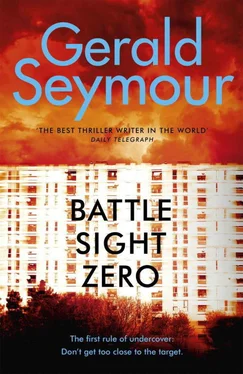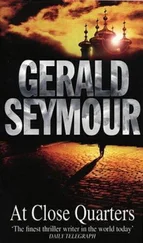Answer. ‘Mind your fucking cheeky tongue.’
‘Everyone knows his name… In the city no one knows your name. Why do you have to run to him, like a lapdog?’
‘You talk too much, you do not know when silence is better.’
A girl had brought Karym a piece of pitta bread, would have straddled him willingly now, but not have known how to talk about an AK-47. The wind blew embers off the cigarettes of those around him on the perimeter of the La Castellane project. He sat and ate, then noted that two kids edged close to him, and that the Algerian boy pushed the Tunisian forward, but both were reluctant to come closer. Karym would have liked to possess a deeper voice, would have enjoyed being able to command. He watched them. They seemed eager to speak, but also frightened of him. He finished the pitta bread that the girl had given him… nobody, ever before, had been nervous of him: nervous of his brother, not of Karym.
‘Yes?’
‘Did you know…?’
‘Know what?’
‘…who saved you. Who, do you know?’
‘How would I?’
‘At the place, my cousin was there. He saw that…’
Karym interrupted the Tunisian boy. ‘Saw what?’
‘His cousin saw, saw who fired,’ from the Algerian boy.
‘A cop fired, just a cop.’
‘Which cop, what cop, do you know?’
And he was bored, and he saw the start of chuckles lighting their faces. ‘I don’t know, I don’t care, I don’t…’
Both spoke together. ‘You should care, should know which cop you owe your life… it was the cop they call Samson… the marksman, the executioner, that cop… you owe your life, Karym, to Samson… what will you do, go to L’Évêché, ask for Samson? Take some flowers for him? Invite him to come and take lunch in La Castellane? Be his friend…? You live because of the cop, Samson.’
The chuckles had become giggles, then their laughter shrilled at him. They ran. He seemed to feel his knees weaken. He stayed sitting, if he had tried to walk away from his perch he was not sure that his legs would support him. He remembered, hot on his skin, the blood of his attacker, and the weight of him when he had kicked the scooter off, had pushed away the body, lifeless from one shot. He had heard that Samson, the killer, had been inside the project a few days before, when his brother had made the barbecue, and had used the big sight on the top of his rifle barrel to scan darkened windows and the rooftops of the blocks, all the time looking for a target; trapped in his nostrils behind the balaclava would have been the sweet and sickly stench given off by the burned body and the gutted car. He spoke to himself, softly, not for anyone else to hear, whispered the words.
‘Thank you, thank you, m’sieur . I am grateful. Always will be grateful. You are my friend.’
And meant it, a true friend. He would like to talk with the cop, Samson, and show off his knowledge of the Kalashnikov, and… He buried the thought. A friend of a cop? Not possible. The wind was sharper, and the overhead cables were braced against it, and sang like a wounded creature. He felt isolated and no longer revelled in his new attention, and wished his brother were there with him.
Hamid shivered, took a step forward, then hesitated.
The voice rasped behind him. ‘You queasy, young man? You scared?’
And he would not have dared show his fear – but could not take the second step.
Deep in a narrow inlet that ran between steep and pitch-black cliffs was a tiny village comprising a few holiday homes, and some traditional fishermen’s bungalows. It was reached by a rough track that, over centuries, had been gouged out of the cliffs. Four-wheel drive and a steady nerve were needed to reach the hamlet. He had gone down with increasing reluctance, on the Ducati motorcycle. The area of coastline was called Les Calanques. It was most often visited by boat, in high summer, and tourists were ferried under the cliffs and through the islands. It was now the depth of the Marseille winter, and tourists rash enough to contemplate a boat sightseeing tour would have arrived in the vieux port in Marseille and found notices on the quayside telling them ‘Cancellation, due to bad weather conditions’. He could not delay long in case his fear shouted to the men snuggled clear of the wind in the back of the vehicle. In front of him, as he stood on a rocking pontoon, one confident stride away, was a fishing boat. The boat was the size used by locals who went out with the long lines and brought in lobsters, crabs, and monkfish – the great prize and paid the best rate. It had an open deck behind a wheelhouse. The vehicle’s headlights showed a paint-scraped hull. Two men were aboard.
The older one and probably his teenage son, worked at ropes and at pouring fuel into the engine, and they wore boots that gave them a good grip on the wooden deck. They seemed oblivious to the pitch of the boat. Hamid stood on the floating pier leading to the boat. He struggled to stay upright, had twice groped for an imaginary handrail, and each time he had been close to toppling… and this was in the shelter of the headlands to his left and his right.
But Hamid had been recruited because he had a reputation for achieving results. A man of power and influence had pursued him. The possibility of big rewards had been dangled in front of him. He was dazzled by the man’s name, and the awesome stories of his ruthlessness as an enforcer… Hamid had thought he could be plucked from his present status as one of several local leaders in the La Castellane project who had a franchise, permission to sell, on one stairwell. If this man, Tooth, let it be known that he favoured Hamid it was the same as opening the doors of a bank vault. On the pontoon, his legs unresponsive, he tried to find courage. Behind him a vehicle door opened, then shut, and he heard the sound of shoes kicking at the gravel leading to the pontoon. He knew little of the sea, could not swim. Dinning in his ears was the roar of the water chasing the length of the inlet and rolling up the shingle beach, and he heard the clattering of waves on protruding rocks, and in the edge of the headlights’ cone was spray bouncing high.
A voice growled. ‘Do you want my work or not? Are you shitting your pants, boy? Are you going or staying?’
He breathed deep. There was a spit in the voice behind him. He was pushed. Firmly, but not violently. Enough force for him to stumble that elusive last step, and then a void was under his feet. He was propelled into an emptied space, and then he tripped on the boat’s side. He fell forward, cannoned down on to the decking and felt a bruising pain in his left shoulder. The voice now was a cold chuckle. The older man and the boy eyed him for a moment, then they pulled him up. They were still in harbour, still tied to the pontoon, and the boat lifted and fell. He was given a life-jacket: neither the fisherman nor the kid wore one. The engine started up. They headed out towards a wall of darkness, had not reached the open sea before Hamid threw up over the side, what he had taken for his breakfast and the snack for his lunch, and retched until his throat was sore.
The motion was worse. He said a prayer, first time in years. Recited what an imam had taught him – and could not speak and had no idea how the terror could be confronted. They went for a rendezvous with a freighter, to take delivery of cargo.
Tooth watched the navigation lights round a marker buoy.
‘A powerful night out there, Tooth,’ Crab said when his friend was back in the car, the door closed and the noise of the night shut out. ‘A desperate night.’
‘The best of nights, my good friend,’ Tooth said. ‘The customs, the coastal radar, they see nothing. The waves are too high and the boat too low in the water. It is a good place, and time, to receive parcels, packages.’
Читать дальше












